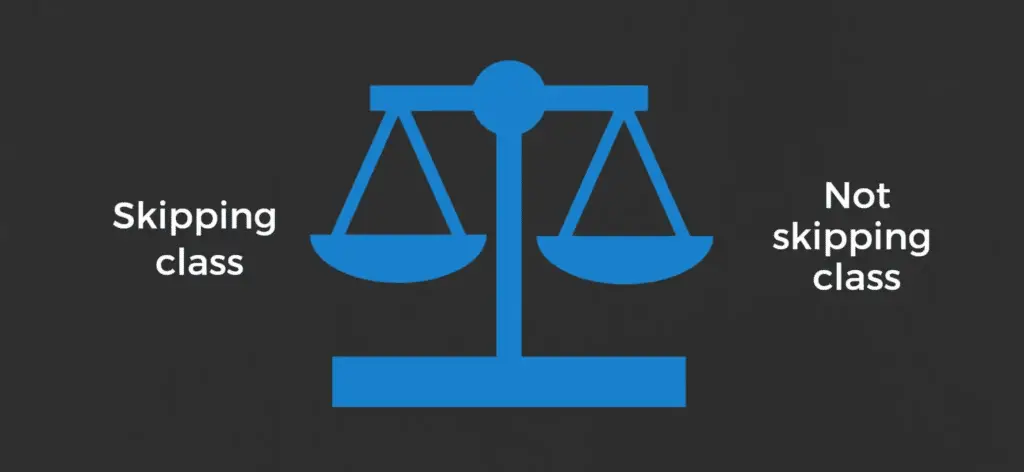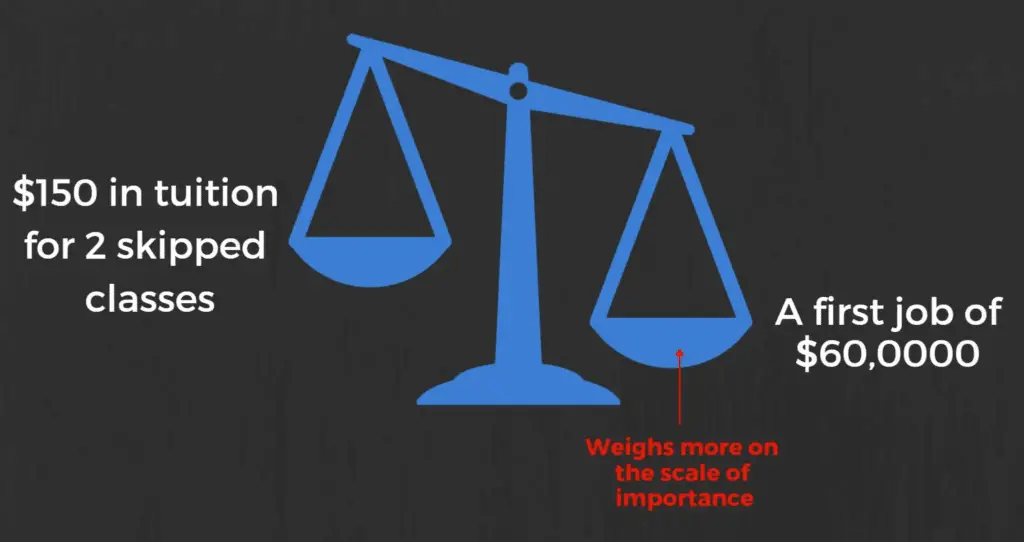This post may contain affiliate links, which means I’ll receive a commission if you purchase through my links, at no extra cost to you. Please read full disclosure for more information.
ME AND MY COLLEGE CLASSES
You may have read articles on why you shouldn’t skip classes in college, but I’m here to share 5 reasons why you should skip class. Whenever I skipped class, it was due to one of these 5 reasons.
During my freshman year, I had perfect attendance. I went to all my classes, even the 7:30 am ones. As time went on and I became an upperclassman, I began to realize what was really important. It wasn’t attendance.
It was doing whatever was necessary to learn, get good grades, and position myself for a career after graduating. Once I discovered that I could achieve those things without attending each and every class, I started skipping.
I didn’t skip all my classes. I’d say I attended about 50% of my classes that didn’t track attendance and 95% of my classes that tracked attendance.
SKIPPING CLASS ISN’T ALWAYS BAD

Prior to college, we attended school from kindergarten through 12th grade, with attendance being one of the most emphasized aspects of school. We associate missing class with something negative.
In college, I wouldn’t say this is always the case. Skipping class isn’t always bad. If your class gives out points for attendance, then skipping would have a negative impact on your grade. I only skipped class for classes that did not track attendance.
What makes skipping class good or bad depends on the cost-benefit analysis your run on any given day. For any class you go to, you’ll ask yourself, “Would the costs outweigh the benefit if I skipped this class, or would the benefit outweigh the cost?”
Whenever I skipped class in college, I always weighed the pros and cons and determined if skipping would be beneficial.
“But You Pay For College! You’re Wasting Your Money!“
Another misconception is that we should attend all our classes because skipping would be a waste of tuition. Students and advisors will break down your tuition bill, credit hours, and classes per semester to remind you that each class you miss is a waste of $75.
I didn’t associate the value of college based on the class lectures. I measured value based on my learning, development, networking, and setting myself up for a career upon graduation. As long as those things were occurring, I was not wasting my tuition money.
Skipping two classes for a price of $150 is worth it in my book if I use that time to study for an interview that can set me up with a job that will bring me $60,000+ out of school. Realize what the end goal is and don’t get lost in the minutiae.

5 REASONS I SKIPPED CLASSES IN COLLEGE & WHY YOU SHOULD TOO
1. The lectures were not productive

The general reason I skipped some of my classes was due to inefficient lectures. The professors just didn’t lead engaging and helpful lectures sometimes. More times than not though, I simply did not find educational value in attending lectures.
I’d say I am pretty self-directed. I enjoy and prefer to teach myself. Lectures are so slow and in one lecture you may get through half a chapter of the textbook and go through 5 examples.
When I read the textbook on my own, I can get through the entire chapter in one sitting and practice many more examples. Per unit of time, this was more efficient for me, so I skipped going to classes that I didn’t find productive.
Note that yes, I skipped class, but only to learn more efficiently. Skipping class lead to something more beneficial to me. Attend all your classes and analyze their worth. Is it worth going to class or could you accomplish more in less time by teaching yourself?
2. Assignments in other classes had greater importance
If I had a large assignment in one class, I would sacrifice other classes to get that assignment done. These could be large homework assignments, group projects, presentations, etc.
On the metaphorical scale, I would have class on one side and the assignment on the other side. I’d measure which one weighed more (had more impact). Then I’d choose the more impactful of the two.
3. To study for a quiz or midterm

In addition to large assignments in other classes, I would nearly always skip the classes leading up to a quiz or midterm. These usually have the most impact on your grade. Because of that, it is essential that you perform well.
For most quizzes and definitely every midterm, I want to ensure I am fully prepared. Preparation entails studying and making sure my mind and body are also optimized.
Grades and your GPA aren’t the most important factors when setting up your career, but they are still important and you should strive to achieve the best you can. If skipping a few meaningless classes can help you score 10% higher on a big test, it is worth it.
4. To attend networking events
I thankfully learned early on in college how important networking is. Through your network, opportunities and partnerships will unfold. In my few years out of college, I have already witnessed the benefit of having a strong network. In fact, I wouldn’t have my job now if it weren’t for a good friend I met in college.
During your college years, your school will put on countless events. Some may be explicitly for networking and others may be simple events where you can network if you want. Networking events will be hosted by the university and the clubs and organizations on campus.
With each event, weigh the pros and cons of attending the event and skipping class. These networking outings can be filled with your student peers, faculty, alumni, and representatives from companies.
Never underestimate the power of making one new connection. That connection may lead to an opportunity. Once you begin putting yourself out there, you’ll be surprised how willing people are to help you out or put you in contact with someone who can.
5. To attend critical career-related events

The fifth reason I skipped my college classes was really a no-brainer. Whenever there was an event that was “career-critical,” I would skip any classes necessary to prepare for it.
Career-critical events are events that are pivotal to setting up your career.
These include:
- Info-sessions
- Interviews
- Interview practice
- Internship duties
Whenever I skipped classes for career-related things, I was usually skipping class to study for interviews and go to interviews.
Understand this: For most of us, the point of going to college is to be employed once we are out.
College → Employment
I always kept that in mind. If an interview meant having a well-paying, prestigious job or not, you can bet that I would skip any number of classes necessary to fully prepare for it.
I would NOT sacrifice my preparation time to still attend class. You can make up what you missed during the class lecture. Sometimes, great job opportunities only come once. You need to make the most of it.
YOU SHOULD NOT SKIP CLASS IF…
I am a supporter of skipping class only for the right reasons. Here are a few reasons you should not skip classes:

It matters for your grade
If your professor keeps track of attendance and it counts for your grade, do not skip class. I was lucky enough to have a large majority of classes that didn’t keep track of attendance.
For classes that track attendance, they will usually allow 3 absences per semester. Use them wisely to skip classes for the 5 reasons we discussed.
The class will cover something critically important
If the class is covering something critically important, you should not skip it. An example could be a class that is a study review for a midterm.
That class is important for the also important midterm. When you skip class, make sure you aren’t missing too much.
You enjoy the professor and class
If you enjoy your professor and their lectures, show up to class. Some professors teach so well and are a joy to learn from. Class is less of a chore and more of a privilege to attend.
When you enjoy your professor, you’ll usually learn more. If you are learning more than you otherwise would on your own, you should attend all the classes you can.
Your professor can be someone valuable to network with
A big reason to attend class is if you respect your professor as someone valuable to network with. These are professors that are intelligent, well-connected, and have experienced the real world. You’ll know these professors when you see them.
Your network is a powerful asset. If you feel like a professor could help you out, be sure to attend class and be active.
Introduce yourself, have some small talk, answer questions during the lecture. Over the semester, you’ll build the connection. I know professors who have been great references for internships, scholarships, full-time jobs, and grad schools.
You have no valid reason to skip
Lastly, if you have no valid reason to skip class, don’t skip class. The times I skipped class were justified by doing something that made better use of the time. You shouldn’t skip class to go home and play video games.
Keep your end goals in mind. Do things that align with your goals. Skipping class for no reason likely does not align with your goals.
SUMMARY
From personal experience, I’d be willing to say that skipping class lead to my successes in college.
By skipping class, I was able to score higher on important assignments and important tests. I was able to go to networking events. And I was able to prepare for the most important career moments of my life: interviews for internships and full-time positions.
Skipping class can be beneficial in different scenarios. The determining factor is if the class is worth it or not.
Remember: don’t believe that your education and experience in college are tied to the classes you attend. You can learn, develop, and set yourself up for your career irrespective of going to 100% of your classes.



